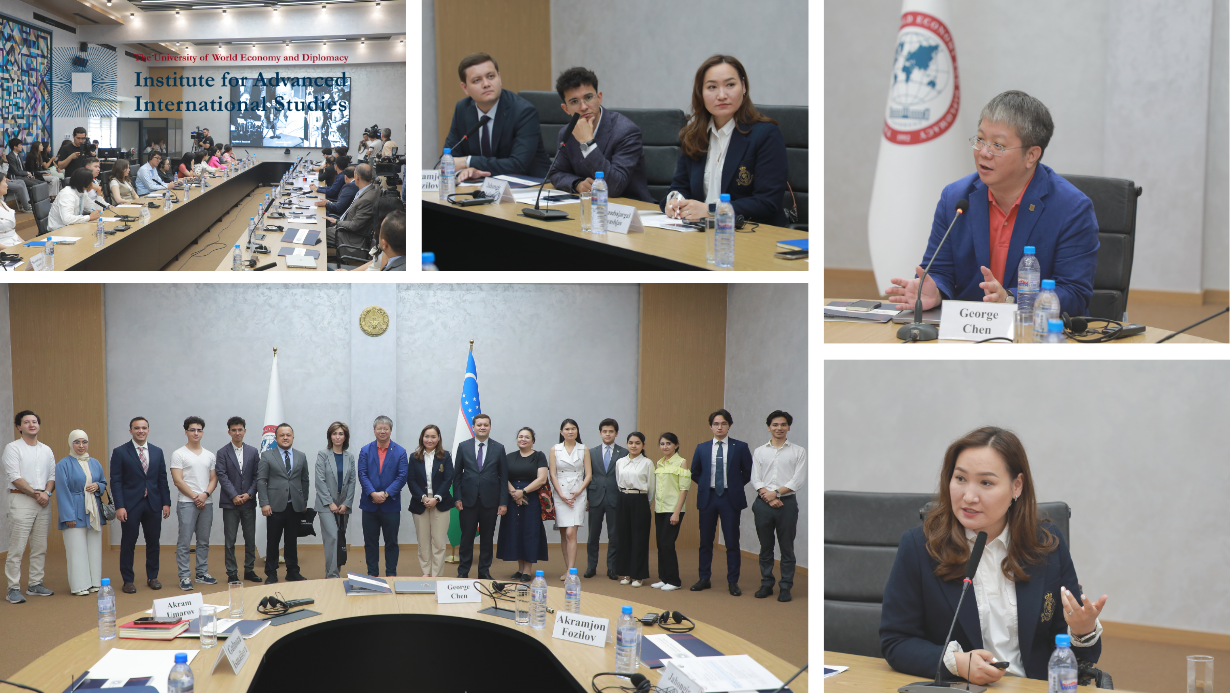
Tashkent, Uzbekistan – On June 6, 2024, the Institute for Advanced International Studies (IAIS) in cooperation with the Mass Media Foundation organized a roundtable on “Media Transformation in the Age of Artificial Intelligence” at the University of World Economy and Diplomacy (UWED), bringing together the academia, journalists, bloggers and other stakeholders.
Akram Umarov, UWED’s First Vice-Rector for Academic Affairs, and Akramjon Fozilov, Executive Director of the Mass Media Foundation, welcomed the speakers and participants of the roundtable and outlined the agenda, noting that the topic chosen for discussion was one of the most pressing today, and launched the discussions.
George Chen, former Managing Director of Facebook in China, Mongolia and Central Asia, Senior Fellow at the Center for Civil Society and Governance at the University of Hong Kong, Managing Director and Co-Chair of Digital Technologies Direction at The Asia Group, presented the impact of artificial intelligence (AI) on the transformation of the media industry. He reviewed the historical evolution of media, from the first news outlets to today’s mobile and digital platforms. Mr. Chen noted that AI is fundamentally changing the media industry by influencing the creation and distribution of content, as well as raising questions of ethics and responsibility. He emphasized the importance of transparency and accountability in the use of AI, and the need for collaboration between governments, technology companies and civil society to develop effective measures to counter misinformation. Mr. Chen also emphasized the potential risks of AI and called for international cooperation to prevent conflicts caused by technological gaps between countries. He concluded by highlighting the importance of responsible use of AI to ensure equity and inclusion in various fields, including employment, health and financial services.
The founder and CEO of the FARO Foundation, Byambajargal Ayushjava, spoke at the event, describing the organization’s mission to promote sustainable practices and digital technologies in Central Asia, Mongolia and the South Caucasus. She emphasized the importance of digital transformation and eco-social governance for the regions, noting that FARO Foundation provides support in curriculum development, trainings, advocacy and technical assistance. As Ms. Ayushjava added, the organization is actively working to improve digital literacy, media and information literacy and understanding of AI ethics. Through its projects, the Foundation campaigns and trains civil society actors to help them implement digital transformation and improve their competencies in various fields. Special attention is paid to combating misinformation and climate change through educational initiatives. The presentation emphasized the Foundation’s commitment to creating a sustainable, secure and technologically advanced future for all.
During the Q&A session, there was a heated discussion of the identified issues. Researchers, students and media representatives discussed important aspects of the topic, including user safety and privacy in social networks, countering misinformation, double fact-checking and the responsibility of editors, the creation of an international institute for AI safe usage, and ethical dilemmas of digital development. The need to introduce technology education in schools and to create content in local languages was also discussed. The session ended with a discussion on the threats and opportunities of AI for Uzbekistan and Central Asia, as well as how AI can help address climate change.
Gulnoza Ismailova, UWED’s Vice-Rector for Science and Innovation summarized the event, thanking the participants and expressing hope for further continued cooperation.
The round table “Media Transformation in the Age of Artificial Intelligence” was a significant event that brought together leading experts, researchers and practitioners to discuss topical issues and challenges facing the media industry in the age of AI. The speakers’ presentations provided deep insights into the topic, emphasizing the importance of transparency, accountability and international collaboration for successful adaptation of AI technologies. The event emphasized the need to integrate technology education and digital literacy to create a sustainable and secure digital future.